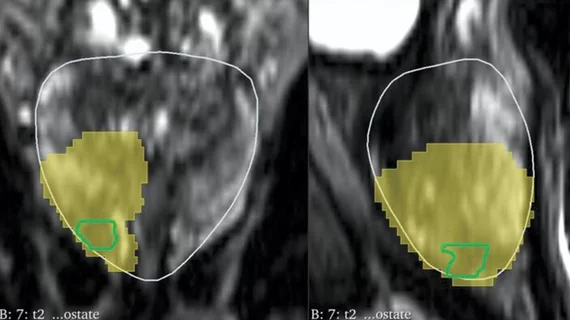AI assistance yields prostate cancer margins 45x more accurate than those defined by rads alone
Artificial intelligence software significantly improves prostate cancer mapping, even among the most seasoned urologists and radiologists, according to new work published in the Journal of Urology.
The study compared the physicians' margin accuracy both manually and with AI assistance and found that AI-assisted cancer margins significantly outperformed cognitively defined and hemigland margins, with an accuracy of 84.7% compared to 67.2% and 75.9%, respectively.
These findings could contribute to expanding use of focal therapy in patients with prostate cancer, experts involved in the study suggest.
“Defining prostate cancer contours is a complex task, undermining the efficacy of interventions such as focal therapy,” study co-author Wayne G Brisbane, MD, from the department of urology at the David Geffen School of Medicine at UCLA, and colleagues note. “However, successful [focal therapy] requires accurate contouring of cancer extent. Unfortunately, conventional cancer contouring requires surgeons to cognitively merge imaging, pathology and clinical factors. In particular, the interpretation of MRI systematically underestimates cancer extent—sometimes severely.”
For the study, seven urologists and three radiologists—some with more than two decades of experience—first manually defined prostate cancer margins using MRI images over a period of four weeks. After, Avenda Health’s AI-powered cancer mapping software, Unfold AI, was deployed on the same cases that had previously been manually defined.
Not only did the software improve the providers' performance in creating accurate cancer margins, but it also effectively tackled the issue of underestimation of cancer extent. AI assistance yielded a negative margin rate of 72.8% compared to 1.6% for manually defined margins.
Authors of the study suggest that use of the software could have a sizable impact on patient care, enabling targeted treatment that minimizes the risk of adverse side effects.
“This study is important because it shows the ability of AI to not only replicate expert physicians, but to go beyond human ability,” the authors note. “By increasing the accuracy of cancer identification in the prostate, more precise and effective treatment methods can be prescribed for patients.”
The American Medical Association also just included Unfold AI in its 2024 Current Procedural Terminology (CPT) code set as a Category 3 code, meaning the software is officially billable by insurance.

